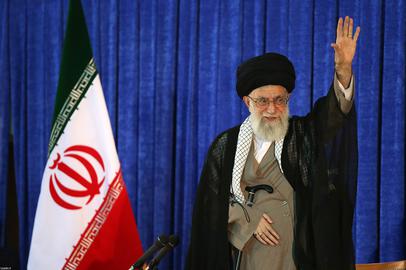When Iranian freestyle wrestler Alireza Karimi intentionally lost a match in November, it was an unprecedented event in the history of sports.
Karimi, Iran’s hope for a world championship gold medal, underwent this self-inflicted humiliation to avoid competing against an Israeli wrestler, and was encouraged by his coach, who stood over his mat shouting “Lose, Alireza! You must lose!” as Karimi competed.
The incident led Rasoul Khadem, the head of Iran’s Wrestling Federation, to joke that even the Palestinians themselves have not endured such levels of self-sacrifice.
This astonishing event has again brought forth the question of why Iran refuses to compete against Israeli athletes in sporting events. In this case — and in similar cases, as when authorities banned footballers Masoud Shojaei and Ehsan Hajsafi, who play for a Greek football club, after they played an Israeli team — the Islamic Republic presented a routine argument: It denies that Israel actually exists as a legitimate state, ignoring its status as a member of the United Nations.
And because the Islamic Republic denies the legitimacy of Israel, it also believes that taking part in sporting events with Israeli athletes cannot be legitimate either. So agreeing to compete in these events signifies a recognition of Israel — and so, as a result, Iranian officials demand that sporting federations and their members avoid any such scenarios. The same logic is at work when, for instance, an earthquake strikes Iran and the government of the Islamic Republic refuses to accept humanitarian aid from Israel because, again, it believes that accepting such aid would mean recognizing a state that it says is non-existent.
But does Iran's insistence that Israel does not exist make any legal sense?
“What Is “De Facto” Recognition?
The Islamic Republic argues that an Iranian athlete competing against an Israeli athlete amounts to a “de facto” — meaning unofficial or implicit — recognition of Israel.
When a new country or a new political system comes into being, other countries recognize the new government either de jure or officially, or accept its existence de facto, meaning implicitly or “in actuality.” In the second case, no official declaration is necessary, but it is considered “recognition” even if the existence of the new country or regime is accepted implicitly, not explicitly. Any interaction — commercial, military, legal, in sports and so on — that assumes the new country or regime has an “identity” is considered a de facto recognition.
It is interesting to note that while the Pahlavi monarchy in Iran had extensive relations with Israel, it never gave Israel a de jure or official recognition. In other words, it only recognized Israel de facto.
So the Islamic Republic’s argument for shunning competition with Israeli athletes has a basis in international law. But it is a little-known fact that, as far as de facto recognition is concerned, there are cases when the Islamic Republic has recognized Israel unofficially. Below are the three most important cases.
1. Ayatollah Khamenei's Recognition of Israel
When former president Mahmoud Ahmadinejad’s calls for “wiping Israel off the map” resulted in heavy international pressure on Iran, Ayatollah Khamenei sought to tone down his belligerent rhetoric by explaining what the Islamic Republic actually meant.
“There is no cure for [Israeli violence] except the annihilation of this regime,” the Supreme Leader said in a speech to university students on July 23, 2014. “[But] annihilating the Zionist regime does not at all mean massacring the Jewish people in the region. The logical statement that our magnanimous Imam [Khomeini] made — that Israel should be annihilated — is based on a human principle. We presented to the world the practical solution for this and no one could criticize it in a reasonable way. We said that a poll and a referendum should be conducted so that the people who live in, come from and belong to this region determine who should rule over it. We said that the people should resolve this issue.”
Khamenei presented the Islamic Republic’s argument as logical and practical. “This is the meaning of annihilating the Zionist regime,” he went on to explain. “This is the solution. This is a solution that is understandable and favored by today's standards of logic in the world. This is a practical solution. We even put forward a proposal to the United Nations and a number of international organizations in charge of such affairs. And this proposal was discussed by them.”
Ayatollah Khamenei wanted to make it clear that the goal was not to physically destroy Israel and massacre Israelis, but to hold a referendum to decide the political system of the land. But legally, such a goal is an implicit recognition of the “existing state of Israel,” a reality that could be changed by hosting a referendum.
One can find no better example than the 1979 referendum in Iran, which served to replace the Iranian monarchy with the Islamic Republic of Iran. A referendum to replace one political system, the Iranian monarchy, with a new one, the Islamic Republic, is an implicit confession that the previous system did in fact exist. So if Ayatollah Khamenei recommends a referendum to establish a new state of Palestine, it is inherently an implicit, or de facto, admission that Israel does indeed exist.
As it happens, Ayatollah Khamenei clearly used this same legal argument about “a recognized political system” in the same speech. “Since the year 1948 — when this fake regime came into being officially — until today, they have been pursuing this policy,” he said. “It is 66 years now that they have been pursuing this policy. Of course, it had committed many crimes in Palestine even before it was officially recognized [emphasis added] and even before colonialists imposed it on the world and on the region.”
In other words if, as Ayatollah Khamenei recommends, a referendum is held but if the majority of voters reject the idea of a larger Palestinian state, the state of Israel would stay in place. This statement by Khamenei amounts to a de facto recognition of Israel.
2. The Islamic Republic's Recognition of Israel at the United Nations
Ayatollah Khamenei has not explicitly announced that the Islamic Republic has recognized Iran at the UN, but, essentially, it has given a de facto recognition to Israel within its pre-1967 borders. In other words, the legal position of the Islamic Republic is that Israel is exactly the same as the autonomous Palestinian Authority — nothing more and nothing less.
On November 29, 2012, on the 65th anniversary of the establishment of the state of Israel as a result of a resolution being adopted by a majority of the UN General Assembly — the day Arabs refer to as Nakba or the “Day of Catastrophe” — Palestinian Authority President Mahmoud Abbas pushed a resolution through the General Assembly that raised the status of the Palestinian Authority to a “non-member state.” In the resolution, the Palestinian Authority agreed to establish a Palestinian state beyond the pre-1967 borders of Israel, meaning on 22 percent of what was historical Palestine, and to concede the other 78 percent to Israel.
In his speech to the General Assembly on September 27 of that year, during which he attempted to convince member states to pass the resolution, Mahmoud Abbas left no doubt whatsoever that he favored the two-state solution.
“The two-state solution,” he told the UN, “i.e. the State of Palestine co-existing alongside the State of Israel, represents the spirit and essence of the historic compromise embodied in the Oslo Declaration of Principles... a compromise by which the Palestinian people accepted to establish their State on only 22 percent of the territory of historic Palestine for the sake of making peace... Despite our feelings of disappointment and loss of hope, we continue to sincerely extend our hands to the Israeli people to make peace... In our endeavor, we do not seek to delegitimize an existing state – that is Israel — but rather to assert that a state that must be realized – that is Palestine.”
The resolution put forward by Mahmoud Abbas that explicitly recognized Israel within its pre-1967 borders was passed by 138 votes, including one from the Islamic Republic of Iran. (Only nine countries, including Israel and the United States, voted against the resolution.) So not only did the Islamic Republic vote for the resolution but also, as the rotating head of the Non-Aligned Movement, it encouraged members of the movement to vote for the two-state solution.
Even more interesting is the fact that, at the time, Hamas had declared its opposition to the two-state solution. And it needs no explanation that by voting for Mahmoud Abbas’s resolution, Iran sided with the Palestinian Authority and not with Hamas. In other words, with its public vote at the UN, the Islamic Republic recognized Israel within its pre-1967 borders exactly as President Abbas wanted.
3. Filing Lawsuits Against Israel at International Courts
The Islamic Republic forces its athletes to avoid competing against Israeli athletes because it is under the illusion that the competition would amount to a de facto recognition of Israel. If so, then how can filing lawsuits against Israel at international courts not count as a recognition of Israel?
In 1994,15 years after the Islamic Revolution, Iran filed a lawsuit against Israel, seeking compensation for the oil that Iran had sold to Israel under the monarchy, but Israel had failed to pay for it. Iran referred the case to Switzerland’s Court of Arbitration. Although Israel refused to participate in the proceedings, in May 2015 the Swiss court ordered Israel to pay Iran more than $1 billion in compensation and damages.
Now the question is that if the Islamic Republic considers Israel to be a fabricated country and denies its existence even within its pre-1967 borders, then how can it file a lawsuit against country that doesn’t exist? If competing against Israel in sports is a recognition of Israel, then why isn’t filing a lawsuit in a court of law not a recognition of its existence?
As we can see, the Islamic Republic recognized Israel a long time ago.
Hossein Alizadeh is a former Iranian diplomat who now lives in Finland.
visit the accountability section
In this section of Iran Wire, you can contact the officials and launch your campaign for various problems

























comments